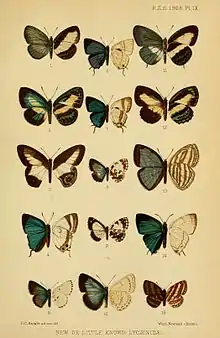Philiris
Philiris is a genus of butterflies in the family Lycaenidae. The species of this genus are found in the Australasian realm (New Guinea, Bismarck Islands, Molucca Islands and eastern Australia, predominantly in Queensland), mostly inhabiting tropical rainforests.[1] Philiris was erected by Julius Röber in 1891. It is a speciose genus. Tite decided on 56 species.[2] Sands[3][4] added 11 species and placed the taxa into 21 species groups (broadly accepted by Parsons).[5] Most species are on New Guinea. Tite considered Philiris and Candalides Hübner, 1819 to be sisters. Eliot (1973)[6] placed Philiris in Luciini Waterhouse & Lyell, 1914, close to Hypochrysops C. et R. Felder, 1860. Compared to other members of the tribe, Philiris have relatively uniform ventral patterns with usually silvery-white ground color.[1]
| Philiris | |
|---|---|
 | |
| Philiris angabunga figure 5 | |
| Scientific classification | |
| Kingdom: | |
| Phylum: | |
| Class: | |
| Order: | |
| Family: | |
| Genus: | Philiris Julius Röber, 1891 |
| Synonyms | |
| |
Species
- Philiris agatha
- Philiris albicostalis
- Philiris albihumerata
- Philiris albiplaga
- Philiris amethysta
- Philiris angabunga
- Philiris apicalis
- Philiris aquamarina
- Philiris argenteus
- Philiris azula
- Philiris baiteta Müller, 2014[7]: 41–44
- Philiris biplaga
- Philiris bubalisatina Müller, 2014[7]: 39–41
- Philiris cadmica
- Philiris caelestis
- Philiris cyana
- Philiris diana Waterhouse et Lyell, 1914 - Large Moonbeam[1]
- Philiris dinawa
- Philiris doreia
- Philiris elegans
- Philiris fulgens
- Philiris gloriosa (Bethune-Baker, 1908)[8]
- Philiris harterti
- Philiris helena
- Philiris hemileuca
- Philiris hindenburgensis Müller, 2014[7]: 47–49
- Philiris hypoxantha
- Philiris ianthina
- Philiris ignobilis
- Philiris ilias
- Philiris innotatus
- Philiris intensa
- Philiris kumusiensis
- Philiris lavendula
- Philiris lucescens
- Philiris maculata
- Philiris marginata
- Philiris mayri
- Philiris melanacra
- Philiris misimensis
- Philiris moira
- Philiris moluccana
- Philiris montigena Tite, 1963
- Philiris nitens
- Philiris oreas
- Philiris pagwi
- Philiris papuanus Wind et Clench, 1947[1]
- Philiris parsonsi Müller, 2014[7]: 49–53
- Philiris petriei Müller, 2014[7]: 35–39
- Philiris phengotes
- Philiris philotas
- Philiris philotoides
- Philiris praeclara Tite, 1963
- Philiris putih
- Philiris radicala
- Philiris refusa Müller, 2014[7]: 44–47
- Philiris remissa
- Philiris satis
- Philiris scintillata
- Philiris siassi Sands, 1981
- Philiris sibatanii
- Philiris subovata
- Philiris tapini
- Philiris tombara
- Philiris unipunctata
- Philiris vicina
- Philiris violetta (Röber, 1926)
- Philiris zadne
- Philiris ziska
References
- Hacobian, B.S.; Braby, M.F.; Petrie, E.A. (2023). "A New Subspecies of Philiris Diana Waterhouse & Lyell, 1914 (Lepidoptera: Lycaenidae) from the Wet Tropics of Northern Australia". Records of the Australian Museum. 75 (2): 65–78. doi:10.3853/j.2201-4349.75.2023.1826.
- Tite, 1963 A revision of the genus Candalides and allied genera (Lepidoptera: Lycaenidae) Bull. Br. Mus. (Nat. Hist.) (Entomol.) 14 (5) : 197-259, pl. 1-4
- Sands, 1979 New species of Philiris Röber (Lepidoptera: Lycaenidae) from Papua New Guinea J. Aust. Entomol. Soc. 18 (2): 127-133
- Sands, 1981 New species of Philiris Röber (Lepidoptera: Lycaenidae) from mainland New Guinea J. Aust. Entomol. Soc. 20: 89–96
- Parsons, M. J. 1998 The butterflies of Papua New Guinea. Their systematics and biology. — London (Academic Press), 737 pp., 26 + 139 pls.)
- Eliot, J. N. 1973. More Revisional Notes on Oriental Butterflies. Entomologist 106: 1–15, 10 figs.
- Müller, Chris J. (2014). "Six new species of Philiris Röber, 1891 (Lepidoptera, Lycaenidae) from Papua New Guinea". ZooKeys (395): 33–55. doi:10.3897/zookeys.395.7110. PMC 3978236. PMID 24715788.
- Parsons, M.J. (1998). The Butterflies of Papua New Guinea. Their Systematics and Biology. London: Academic Press.
External links
 Media related to Philiris at Wikimedia Commons
Media related to Philiris at Wikimedia Commons Data related to Philiris at Wikispecies
Data related to Philiris at Wikispecies- "Philiris Röber, 1891" at Markku Savela's Lepidoptera and Some Other Life Forms